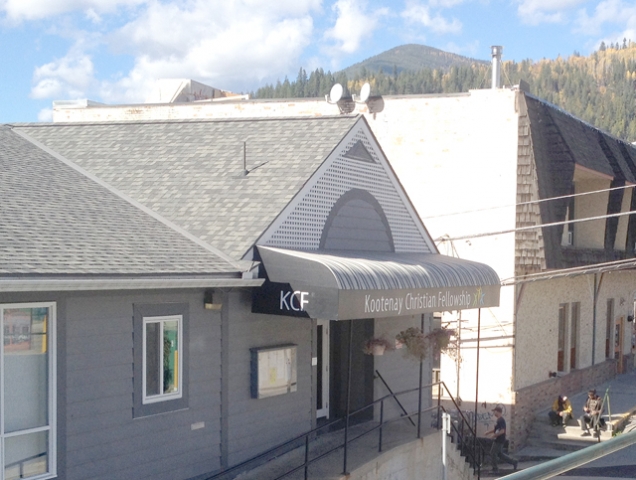The many forms of panhandling: Hot issue from the street gets a police and social service perspective
As city council prepares to go public and gain a broader spectrum of input into its draft panhandling legislation, police and one of the city’s major social services weighed in on the issue of panhandling in Nelson.
Panhandling is certainly a regular call for police and bylaw officers, said Nelson Police Department deputy chief constable Paul Burkart. City officers have responded to a minimum of 57 calls in the past year regarding the behaviour of panhandlers.
“Most (of those calls) will be during the summer and you can imagine that the vast majority of people will not be calling the police even if they feel harassed by a panhandler’s behaviour,” he said.
“Is it worse in Nelson than most cities? Probably not. But most cities already have panhandling bylaws — we don’t.”
Although panhandling is an increasing occurrence in the city, it is not an increasing problem, said Kootenay Christian Fellowship pastor Jim Reimer, who operates Our Daily Bread — a daily hot lunch program.
Panhandling is increasing everywhere due to rising prices and stagnate government support for those disadvantaged, he said.
But transients have been coming to Nelson for 30 years, Reimer noted.
“Some of our best citizens came here as transients to escape the draft during the Vietnam War. Others have come just because they heard about us and have fitted well into our social and economic fabric of our community,” he said.
To suggest that people come here just because of the abundant social service sector is naïve, Reimer pointed out.
“People are attracted to our area for various reasons including the many festivals in the Kootenays, the culture, the climate and friendly people,” he said.
“As a tourist destination city we welcome the money, but then we also must recognize there is an element that will come that won’t fit into our cultural norms. This is to be expected. With every blessing is a challenge.”
Nelson is famous and gets more than its fair share of press, Reimer continued.
“We all rejoice when that happens, but then we should not be surprised that a mix of people arrive on various levels of the economic scale,” he said. “What I am saying is we can’t have one without the other.”
The proposed regulatory bylaw regarding aggressive panhandling would not stop people from panhandling. Instead, it establishes guidelines for people who panhandle within the City of Nelson, while protecting the safety of everyone involved.
The bylaw states that no person who panhandles may “obstruct or interfere with a bylaw enforcement officer in the exercise of his duties,” nor panhandle in a manner to cause an obstruction.
An obstruction was defined as:
- Approaching pedestrians more frequently;
- Becoming aggressive toward pedestrians, causing pedestrians to become un-comfortable walking downtown, even crossing the street to avoid certain areas;
- More signs being held by panhandlers which are extremely offensive;
- Blocking of the sidewalk passage, putting both the pedestrians and panhandlers into an unsafe and hazardous situations.
If the bylaw passed into legislation, fines could be handed out and court time would be incurred if the incidents escalated.
Prior to discussing third reading of the bylaw last week, city staff recommended to city council to reduce the distance panhandling could occur at various locations from 10 metres to five metres.
A Charter of Rights and Freedoms consideration halted the addition of language regulating the words and images used on a panhandler’s signage.
However, city council did not discuss the merit of the proposed changes. Instead, the issue of casting the net of public discourse wider prior to third reading meant tabling the draft legislation until its next regular meeting in November.
Reimer did not agree with the bylaw in the form it took after second reading.
“It is too far reaching in nature. If the conditions as set out are enforced it would effectively eliminate panhandling in Nelson,” he said.
“This would have a serious consequences as some people need to panhandle just to make ends meet. Getting a job is often not an option due to the many barriers that can exist, such as mental illness, lack of education or physical disabilities.”
If the new bylaw passes, Burkart said it would assist police in keeping the streets safe from aggressive panhandlers.
“At present, unless the individual has crossed the line into criminal behaviour — causing a disturbance, assault, criminal harassment — the officers are very limited in how they deal with individuals,” he said.
Nelson police have charged a number of people in the past few years when their behaviour crossed over to criminal — causing a disturbance, uttering threats of death and mischief.
But for those that are creating a nuisance or making it difficult for people to shop or eat at the city’s downtown businesses, or enjoy what else the downtown offers, police need tools to deal with this behaviour and Burkart hoped the new bylaw would provide the officers with those tools.
“The Safe Street Act, local busking laws, and of course the Criminal Code do address some of our concerns, but a local bylaw can provide Nelson with specific limitations to address specific problems we experience in Nelson,” he said.
Burkart admitted there could be potential Charter of Rights and Freedoms challenges.
“Every day the courts redefine and reinterpret the laws and law enforcement needs to adjust to the court’s interpretation, as we are seeing with the medical marijuana issue,” he said.
The city’s chief of police brought the issue of aggressive panhandling forward as a topic at the chief’s diversity advisory meetings — as part of the larger street disorder topic — with many of the city’s local groups ranging from college and school representatives, social service agencies, mental health, city councilors, religious groups and the Downtown Business Association and the Chamber of Commerce.
“The law being proposed by the city we feel does a good job of balancing the rights of the panhandlers and those of the business owners, their customers and others that frequent the downtown to access the services being offered,” said Burkart.
Reimer thought the bylaw would not be necessary if the city had the proper infrastructure in place.
“If we had a safe outdoor space for people to hang out, without fear of harassment, then we would see less of the transients on the streets,” he said.
“In addition, some people have to panhandle just to make rent each month. We need supportive housing, more low market rental units and three bedroom units for families that are affordable.”
According to the fourth annual Report Card on Homelessness for Nelson (2011) — the latest available data — authored by the Nelson Committee on Homelessness, there are more people out in the cold and without a place to live because of the low rate B.C. social assistance pays for shelter.
B.C. provincial social assistance and disability rates provide a $375 shelter allowance for rent, the report noted.
“This is inadequate to ensure a safe, healthy home in our city, where the average advertised rate for a one bedroom is $776. Consider, at this rate, an individual with a life-long disability receiving provincial PWD (person with disability) benefits will be required to spend 85 per cent of their income on rent. This leaves just $130.42 left over for everything else, including food and all other costs of living,” the report stated.
As a result, according to a youth survey within the report, 22 per cent of youth on the street turn to panhandling to make ends meet.
In addition, Nelson is the smallest community in the nation to receive federal funding under the Homelessness Partnering Strategy. In 2004 the city was a designated community to receive federal homelessness funding because Nelson has one of the highest proportions in the province of households paying over 50 per cent of their income on rent.
The Nelson Committee on Homelessness representatives were contacted about thoughts on the panhandling bylaw but elected not to comment until after its next board meeting later this month.


























Comments